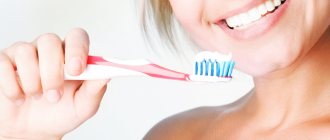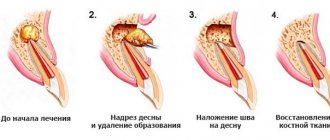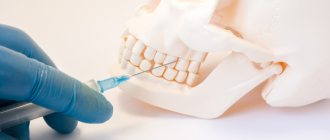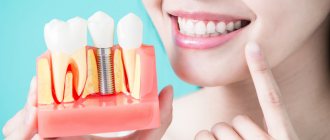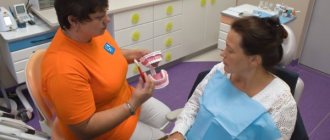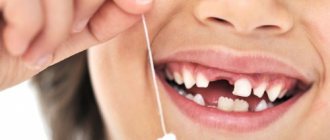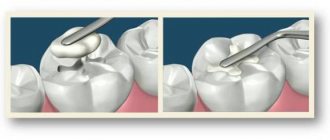Characteristics of the profession - what it does, functions and responsibilities
Let's see what specializations dentists have:
- The therapist is the doctor to whom you turn first. The general practitioner analyzes the general condition of the teeth. Finds problem areas, treats caries, removes nerves, puts fillings and restorations, and prepares teeth for prosthetics.
- The surgeon performs operations in the oral cavity: removes teeth, restores the jaw after injuries, prepares the oral cavity for implantation, prosthetics, orthodontic and orthopedic treatment. Deals with problems related to inflammatory processes, cysts and tumors.
- An orthodontist corrects malocclusion – a situation where the jaws do not close straight, but deviate to the right or left; corrects the curvature of the teeth - increased crowding, in which the teeth have “not enough space” and they run into each other or vice versa. The result of his work carries an important aesthetic point for the patient.
- Orthopedist – comes to the rescue when teeth are missing. Restores them with the help of dentures, removable or permanent, and fully reproduces the important chewing function. If it was possible to save a small part of the tooth, then it uses restoration technology using a crown. This doctor works in tandem with a dental technician - a specialist in the manufacture of dentures and prosthetic elements for a specific case.
- Hygienist is a relatively new field. Monitors the cleanliness of the oral cavity, carries out preventive and hygienic procedures to maintain oral health. Removes plaque, tartar, polishes enamel. Provides consultations regarding the prevention of dental diseases.
- Implantologist – specializes in restoring lost teeth using implants. Innovative technology allows you to install tooth analogues that are no different from real ones. Conducts a full examination, preparation in several stages and the implantation itself. Observes the patient throughout the entire period of rehabilitation after the intervention.
- A pediatric dentist is a doctor who deals with children's dental problems. Removes and treats baby teeth so that the molars develop healthy; puts fillings; fights oral diseases that children are prone to at an early age. A pediatric dentist should not be a doctor, but a kind wizard who will convince the child to treat his teeth and be able to perform all the manipulations without tears.
Features of the profession
The main tasks of an orthodontist include:
- identifying the reasons that contributed to the formation and development of pathology;
- study of the degree of complexity of the patient’s problem;
- selection of an adequate and effective course of treatment, taking into account the individual characteristics of the client and diagnosis;
- carrying out preventive measures to prevent recurrence of abnormal changes;
- records management;
- performing dental procedures - tooth extraction or pain relief, if required by a specific situation;
- providing medical assistance if necessary.
The specialist is also obliged to familiarize patients with the rules of oral hygiene . The scope of his employment is significantly narrower than that of dental therapists. The result of the orthodontist’s work is considered to be a flawless and even smile.
Attention! Within the profession there is a division into pediatric and adult orthodontist. Treatment methods will be different for each age group.
The doctor’s choice of specific actions is directly related to the nature of the client’s pathology. At the first appointment, the specialist will not install braces or corrective plates ; this requires special preparation.
The first visit to the orthodontist involves a thorough visual examination, preliminary diagnosis and consultation on recommended methods of getting rid of pathology. After making a diagnosis, he prescribes treatment and carries out procedures to correct the dentition. Finally, the achieved results are recorded using special structures - a tray or thin wire.
What a dentist should know and be able to do - personal qualities and skills
First of all, have a great desire to help people. There is no person who has never had a dental problem.
The doctor must find an approach to everyone, convey the need for the procedures performed and set them up for a positive outcome. Calm and support.
The profession is associated with the ability to work with a large amount of information at the initial stage; in the future, it is important to be able to successfully combine knowledge with practice. This is the basis for making a diagnosis - a decisive role in dental treatment.
A lot of daily work awaits the future specialist. The profession implies constant improvement and training, because modern dentistry does not stand still, new types of treatment appear every year.
This is important: a modern doctor must not only know about innovations, but also be able to apply them in practice.
Important personal qualities
The most important thing here is the psychological factor. Dental correction is a long process. It takes from 6 months to 2-3 years. And most often you have to deal with children. Therefore, you need to be able to establish trusting contact with them. You can’t do this without the ability to empathize and communicate.
Stress resistance and the ability to smooth out conflict situations are also valued. And in order for the treatment results to always be positive, you need to take your work responsibly. Hard work also requires goodwill, balance and tact.
And no less significant will be the desire for self-development. A specialist must regularly improve his competence and skill level , and understand new treatment methods.
Arrange yourself a dental tour to Ryazan! What exactly is the advantage of dental treatment for you at the Estetika clinic in the city of Ryazan?
– Prices are 50-70% lower than in Moscow! – Only 2.5-3 hours on the road (for Moscow, comparable to a trip to work) – Ryazan has 20 times fewer residents than Moscow, so the reputation of the clinic is of greater importance – Visits are conducted by experienced, highly qualified doctors who undergo training in large educational centers in Moscow. Equipment and materials are purchased in Moscow.
Types of dentist specializations
Dentists have certain specializations. Each of them has its own narrow direction:
- The therapist performs an initial examination, conducts diagnostic tests and basic treatment of the oral cavity (tooth filling, nerve removal, preparing the oral cavity for further procedures). He treats caries, gumboil, gingivitis, periodontitis, and pulpitis.
- The orthodontist corrects the dentition and changes the incorrect placement of teeth. His work includes installing bracket systems, plates and caps.
- An orthopedist works to restore the integrity and functionality of dental units using dentures or special materials. A dental technician assists him.
- The surgeon performs the following operations: tooth extraction, manipulation of the bones and ligaments of the jaw, preparation for implantation. Such interventions are necessary for severe injuries, defects, and inflammatory pathologies.
- The hygienist gives preventive recommendations on maintaining oral hygiene and minimizing the risk of pathologies, and cleans from dental plaque and stones.
- The periodontist carries out measures to treat the gums and soft tissues around the teeth. He provides consultations in case of symptoms such as bleeding and inflammation of the gums, loose teeth, and bad breath.
- A pediatric dentist treats teeth and oral pathologies in children.
What subjects need to be taken
To enter the Department of Dentistry, students must pass mandatory exams in the subjects of biology and chemistry. An additional subject from the university and one of the applicant’s choice are also taken.
It is advisable to have at least a basic knowledge of Latin, which is the basis in medical terms. After 9th grade, you can go to college, where the requirements for OGE scores are much lower.
Like any university, medical schools have paid training (for those who do not pass the test) and budget training (available to certain categories of people and high-impact students whose Unified State Exam scores are close to 300).
The answer to the question of how much tuition costs should be found on the website of a specific university.
Stages of training
The initial stage of training to become a dentist is admission. The second stage is that a dental student must successfully complete 5 courses. It would seem that he studied for 5 years, received a diploma from a university in the specialty “dentistry”, celebrated graduation and for a dental unit, however, the path to perfection does not end there. In order for a young specialist to take up his post and begin his good work of saving himself from toothache, he must enroll and successfully study in residency for 2 years and receive a specialist certificate. Residency for a dentist includes the following specialties:
- "therapeutic dentistry"
- "orthopedic dentistry"
- "surgical dentistry"
- "orthodontics",
- "Maxillofacial Surgery".
A dentist therapist deals with the treatment of diseases such as caries, pulpitis, periodontitis, etc. (we recommend reading: what responsibilities does a dentist therapist have in dentistry?). To install a filling and treat the nerve of a tooth, you must contact this specialist. Orthopedics includes procedures for replacing defects in the dentition, i.e. An orthopedist installs crowns, veneers, and removable dentures for elderly patients. It takes 7 years to study to become an orthopedist and therapist (more details in the article: orthopedic dentist - who is he and what does he treat?).
An orthodontist also works to restore the function and aesthetics of the dentofacial system, and he achieves high results with the help of devices such as braces, plates, and transparent aligners. It should also be noted that training to become an orthodontist follows the same scheme as for dentists of other specialties: 5 courses at a medical university, plus two years of residency in the specialty “Orthodontics”.
Training in the specialty “Maxillofacial Surgery” is very important, because these are the specialists who perform operations on the head and neck, where there are many vessels and nerve trunks, the slightest damage to which can lead to inevitable consequences, so it is very difficult to study as a maxillofacial surgeon .
Which universities offer training in this specialty?
According to statistics, medical education in Russia is of the highest quality, and this is the key to a healthy nation. There are no special dental universities in our country.
Almost every medical school is recruiting for the Faculty of Dentistry. Depending on the chosen educational institution, different forms of education will be offered: full-time, part-time, evening.
You can enroll after 11th grade. This specialty is also offered by medical technical schools and colleges, which can be entered after completing 9 grades.
As a rule, all educational institutions have budget places. To take them, you need to have a high score on the Unified State Examination, otherwise the cost of training will fluctuate up to 400 thousand for leading universities in Moscow and St. Petersburg and on average up to 250 thousand in the regions. Education in technical schools and colleges costs an order of magnitude lower.
Where can I get training?
To obtain a dental specialty, you must undergo training at a special higher educational institution. There are several universities in Moscow that offer the opportunity to acquire this profession:
- Moscow State Medical and Dental University named after. A.I. Evdokimova is a leading educational institution in Moscow. This institution offers the opportunity to study on a budgetary basis, a wide choice of specializations and the opportunity to undergo practical training in treatment centers at the university.
- At the First Moscow State Medical University named after. I.M. Sechenov can also undergo training at the Faculty of Dentistry. Here is a selection of specializations in the main areas of this section of medicine, and you can undergo special practice in a virtual clinic.
- The Russian National Research Medical University named after N.I. Pirogov also provides an opportunity to become a dentist. Here, a special role is given to practical training on simulators or with real patients.
- The Faculty of Medicine of the Peoples' Friendship University of Russia also deserves your attention. Lectures are given by distinguished scientists, and laboratories are equipped with the latest equipment.
These universities are considered the most prestigious; there is a lot of competition for places. The regions of the country also have their own medical educational institutions, where the opportunity to acquire this profession is presented. Many of them provide the opportunity to undergo paid training.
Secondary vocational educational institutions cannot provide the necessary knowledge for the dental profession. Such training will only allow you to become a dental technician or assistant.
List of universities that teach dentists.
There are about 50 higher medical educational institutions (state and non-state) in Russia, where they teach in the field of Dentistry.
Important! Before applying to a non-state university, you need to make sure it has a license and accreditation, and also study its reputation in the labor market.
Listed below are the main and most significant metropolitan and regional universities, whose graduates are especially valued in the labor market. You can enroll in places financed from the budget or study on a commercial basis.
Moscow:
- First Moscow State Medical University named after I.M. Sechenov
- RNRMU named after N.I. Pirogov
- Peoples' Friendship University of Russia
- MGMSU named after A.I. Evdokimova
Saint Petersburg:
- First St. Petersburg State Medical University named after academician I.P. Pavlova
- Northwestern State Medical University named after I.I. Mechnikov
- St. Petersburg State Pediatric Medical University
Regions:
There are dozens of public medical universities in the regions, which makes it accessible to become a dentist even in the most remote areas of the country.
The highest positions in the rankings are occupied by:
- Northern State Medical University (Arkhangelsk)
- Kazan State Medical University
- Siberian State Medical University (Tomsk)
- Orenburg State Medical Academy
- Samara State Medical University
- Irkutsk State Medical University
- SSMU named after V.I. Razumovsky (Saratov)
- Nizhny Novgorod State Medical Academy of the Ministry of Health and Social Development of the Russian Federation
- Kemerovo State Medical Academy
- Tyumen State Medical University
- South Ural State Medical University (Chelyabinsk)
What do you need to know before enrolling?
Even if you have studied all the disadvantages of the dentist profession before enrolling and are ready to come to terms with them, you need to once again reasonably assess your own strengths and recognize the absence or presence of certain qualities necessary for a dentist.
In addition to the acquired professional knowledge, a dentist must have qualities appropriate to his work. An evil dentist is a bad dentist.
Required qualities include:
- Stress resistance
- Developed fine motor skills of the hands
- Attentiveness
- Patience
- Good memory
- No problems with vision or coordination of movements
During training, it is also necessary to master knowledge in the field of human physiology and anatomy at a high level.
Important! Dentistry is one of the high-tech branches of medicine, using innovative tools and equipment that you must be able to handle professionally.
You also need to understand that studying at medical universities, unlike many others, is longer and more complex, which means it requires students to have increased motivation, readiness for a significant reduction in free time, patience and, possibly, a change in lifestyle in general.
The level of satisfaction in life, the degree of success and self-realization depend on the correct choice of profession. By choosing dentistry as your future activity, you are already beginning to bear greater responsibility for your knowledge and actions. Dentistry is a lifestyle, and if you are ready for it, then gain strength and patience, because after completing your studies you will receive a prestigious and interesting profession.
How many years does it take to study to become a dentist?
The duration of study is 5 years to obtain theoretical knowledge; after the second or third year, students will have their first internship and a year of full-fledged internship in their future profession.
After receiving basic knowledge, applicants each go in their own direction.
Is it difficult to study? - applicants ask. As elsewhere, it all depends on interest, abilities and desires.
Where can a dentist work?
Commercial dentistry is now leading the way in providing jobs. The state is pursuing a policy that supports medical workers, providing decent wages, high pensions and the opportunity to purchase subsidized housing.
This profession will always be popular and relevant, because every person has been a patient of a dentist for almost his entire life.
Career growth of a dentist
Dentists are divided into categories: first, second and highest. To confirm the first category, you need experience (three years), protection of the following categories after seven and ten years, respectively.
Confirmation is carried out before the commission with a report on the work done. To advance up the career ladder, you need to be a talented and hardworking doctor; your merits will not go unnoticed.
Is it worth studying to become a dentist - the pros and cons of the profession
The main thing is to have a great desire to treat patients’ teeth. Working with people is psychologically difficult, and the profession also involves enormous physical labor: working with your hands, in one position, under tension.
But it's worth it - nothing compares to the happy and grateful faces of patients.
Going to study based on the mere demand for a profession and fairly high wages is not entirely correct. It’s like an artist’s calling to become a musician, because they get paid more, even though he is only talented in drawing. It is better to find a profession you like and achieve success there.
Being a doctor is not only a calling; doctors take the Hippocratic oath, which says “do no harm.” This should be the basis when choosing the profession of a doctor, and a dentist - in the first place!

